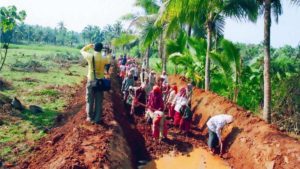Schemes for Employment Generation in Rural India
According to the census of 2011, more population between the ages of 18 and 34 years live in its rural areas of which 55 million are potential workers. At the same time world is expected to face a shortage of 52 million workers in 2020. Hence, the big dream of India becoming a five trillion economy cannot be achieved without including villages.
Schemes & Initiatives for Employment Generation in Rural India
- MGNREGS – It has provided nearly 235 crore person days work in last several years.
- Pradhan Mantri Awaas Yojana-Gramin (PMAY-G) to by 2022 in the rural areas. The scheme was launched in November 2016 with the aims of constructing 2 crore 95 lakh houses by the year 2022.
- Skill Upgradation and Mahila Coir Yojana: The scheme comes under Coir Vikas Yojana and provides development of domestic and export markets, skill development and training welfare
activities of the coir workers.
- Pradhan Mantri MUDRA Yojana – Launched in 2015 with the twin aims of providing credit of upto Rs. 10 lakh to small entrepreneurs and act as a regulator for Micro-Finance Institutions. The loans are easily accessible in three categories: Shishu, Kishore and Tarun to signify the stage of growth/development and funding needs of the beneficiary.
- Pradhan Mantri Kaushal Vikas Yojana to enable a large number of Indian youth to take up industryrelevant skill training that will help them in securing a better livelihood.
- MSDE is also promoting establishment of model and aspirational skill centres known as Pradhan
Mantri Kaushal Kendra (PMKK) in every district for imparting skill training through PMKVY.
- Deen Dayal Upadhyaya Grameen Kaushalya Yojana Launched by Ministry of Rural Development with the dual objectives of adding diversity to the incomes of rural poor families and cater to the career aspirations of rural youth.
- Shyama Prasad Mukherji Rurban Mission (SPMRM) – The Mission is based on the atma gaonki, suvidha sheharki.
- Rurban clusters by stimulating local economic development, enhancing basic services. Under the mission 300 Rurban clusters are envisaged to be developed in a time bound manner

